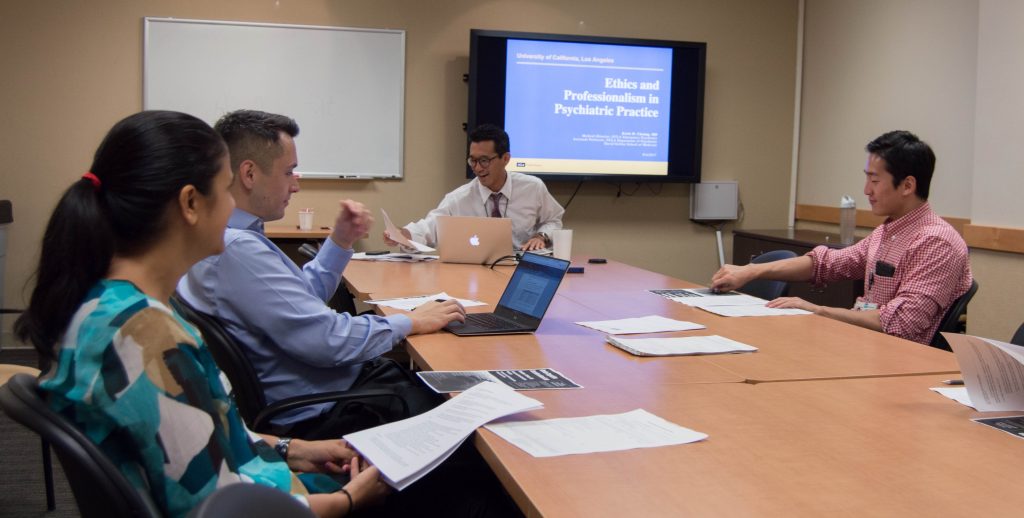Didactics

Our program believes that a well-rounded clinical experience coupled with a comprehensive core curriculum is the key to training the next generation in the field of psychiatry. Structured educational opportunities take a variety of forms. Grand Rounds presentations are held weekly at the UCLA campus. Catered lunches during the week feature invited speakers and journal club presenters. For residents in each year of the program, formal didactics are held one half-day a week during protected time in which residents are excused from their clinical responsibilities.
The curriculum during PGY-1 includes a core diagnostic series with an overview of all major mental disorders as well as an introduction to psychopharmacology with an increased focus on social determinants of mental health. Didactics during PGY-2 takes the core concepts introduced during PGY-1 and expands on them, with a focus on advanced diagnoses, psychopharmacology, and psychotherapy. The PGY-3 curriculum shifts the focus from acute settings to outpatient clinics to reflect the increased focus on psychotherapy and long-term management that occurs during the last two years of residency. Finally, the PGY-4 curriculum is largely elective, allowing senior residents to choose from a variety of courses (such as building a private practice or learning to engage in mental health advocacy) based on what suits their career goals. There is also a robust curriculum in community and global mental health embedded throughout the four years.
The PGY-1 curriculum is structured around a Core Diagnosis Series which provides an overview of all major categories of disorders that psychiatrists treat, including diagnosis, epidemiology, prognosis, treatment, social determinants, and neuroscience. There is also a broad introduction to psychopharmacology. Foundational concepts from other areas of psychiatry are introduced, to be expanded upon later in the curriculum.
- Core Diagnosis Series: Introduction to Depression
- Core Diagnosis Series: Introduction to Bipolar Disorder
- Core Diagnosis Series: Introduction to Schizophrenia
- Core Diagnosis Series: Introduction to Personality and Personality Disorders
- Core Diagnosis Series: Introduction to Anxiety Disorders
- Core Diagnosis Series: Introduction to Trauma-Related Disorders
- Core Diagnosis Series: Introduction to Obsessive-Compulsive Disorders
- Core Diagnosis Series: Introduction to Addiction, Intoxication, and Withdrawal
- Core Diagnosis Series: Introduction to Somatoform Disorders
- Core Diagnosis Series: Introduction to Human Development and Developmental Disorders
- Core Diagnosis Series: Introduction to Autism
- Core Diagnosis Series: Introduction to ADHD
- Core Diagnosis Series: Introduction to Dementia
- Core Diagnosis Series: Introduction to Eating Disorders
- Landmark Articles Series (STAR*D, STEP-BD, CATIE)
- Principles of Psychopharmacology
- Introduction to Psychotherapy Modalities
- Principles of Psychiatric Evaluation
- Introduction to Child/Adolescent Psychiatric Interviewing
- Psychiatric Emergencies
- Suicide Risk Assessment
- Introduction to Equity, Diversity, and Inclusion in Mental Health
- Community/Global Psychiatry Module: Social Determinants of Health, Structural Competency, Patient Care, and Systems Transformation
- Introduction to Therapy
- Introduction to Applied Neuroscience
- Principles of Evidence-Based Psychiatry and Biostatistics
- History of Psychiatry and Phenomenology
The PGY-2 curriculum takes the core concepts introduced in PGY-1 and dives more deeply into them. There are a number of core “blocks” throughout the year covering these major disorders, with a focus on acute and inpatient management. In addition, a variety of psychotherapeutic modalities are introduced to assist in the transition from inpatient to outpatient.
- Mood Disorders Block
- Psychotic Disorders Block
- Anxiety Disorders Block
- Personality Disorders Block
- Child/Adolescent Psychiatry Block
- Substance Use Disorders Block
- Trauma-Related Disorders Block
- Sleep Disorders Block
- Consultation-Liaison Psychiatry Block
- Forensics Block
- Community/Global Psychiatry Module: Global Mental Health
- Community/Global Psychiatry Module: Carcerally involved Populations and Services
- Family Meetings
- Attachment
- Child and Adult Development
- Introduction to Dynamic Psychotherapy
- Introduction to CBT
- Introduction to DBT
- Introduction to Interpersonal Psychotherapy
- Supportive Psychotherapy
- Psychodynamic Psychotherapy
- Short-Term Psychodynamic Psychotherapy
- Transference-Focused Psychotherapy for Borderline Personality Disorder
- Mentalization-Based Treatment for Borderline Personality Disorder
- Psychiatric Genetics & Epigenetics
The PGY-3 curriculum contains several core blocks for each of the major types of disorders, with a particular focus on outpatient management and acquiring psychotherapy skills.
- Outpatient Management of Mood Disorders
- Outpatient Management of Psychotic Disorders
- Outpatient Management of Anxiety
- Psychotropic Drug Interactions
- Community/Global Psychiatry Module: Homelessness and Homeless Services
- Personality Disorders
- Impulse Control Disorders
- Sexual Behavior and Disorders
- Eating Disorders
- Outpatient Substance Abuse
- CBT
- Forensic Evaluations
- Psychodynamic Psychotherapy
- Group Therapy
- Interpersonal Psychotherapy
- Couples and Sex Therapy
- Short-term Psychodynamic Psychotherapy
- Focused Dynamic Therapy
- Cognitive Assessment
- Women’s Mental Health
- Experiential Psychodynamic Psychotherapy
The PGY-4 curriculum is largely structured around advanced elective blocks focusing on specialized areas within psychiatry. As electives, residents are able to sign up for those courses that interest them and skip ones that will not be applicable to their careers.
- Frontiers in Neuropsychopharmacology
- Positive Psychology
- Private Practice
- Couples and Sex Therapy
- Community/Global Psychiatry Module: Advocacy and Structural Competency Selective
- Psychiatry and the Law
- AB-ISTDP
- Dreams in Psychotherapy
- Neurology for Psychiatrists (Boards Review)
- Neuroscience & Psychotherapy
- Introduction to Klein
The Semel Institute holds weekly Grand Rounds on Tuesday mornings at 11:00am, featuring presentations on evidence-based clinical practices, cutting-edge insights from neuroscience, and the role of society in shaping mental health. The talk is livestreamed and is accessible for residents who are at off-site locations. For more information including a calendar of upcoming talks and recordings of past presentations, visit grandrounds.semel.ucla.edu.
Free lunch is provided to residents whenever there is a lunch talk! Mondays are Residents’ Council meetings, a residents-only time when people can get together, catch up, get updates on the program, and provide feedback to resident leadership. The rest of the week features a variety of educational series including:
- Consultation-Liaison Case Conference
- Cutting Edge Journal Club
- Curriculum Committee
- Community and Global Psychiatry Case Conference
- Women in Psychiatry
- Research Lunch
- Psychoannals (Classic Psychodynamic Articles)
- Social Psychiatry
- Social Justice Teach-Ins
- Interviewing Course
- Master Clinician Rounds
